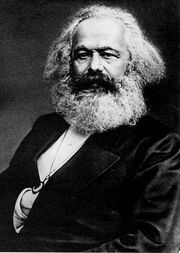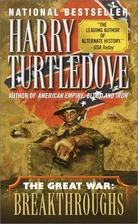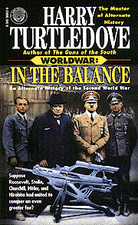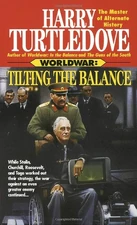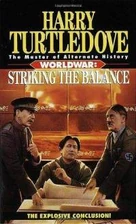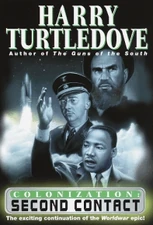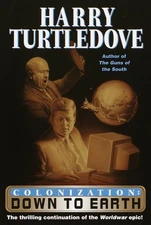| ||||||||||||||||||||||||
Karl Marx (5 May 1818 - 14 March 1883) was a political theorist who conceived of the idea of communism and outlined it in The Communist Manifesto. Marx supported violent revolution as the means to ensure social progress. Much as feudalism replaced capitalism, Marx believed, so would capitalism fall to its own inherent class divides to socialism. He was a hero of revolutionaries around the world and was revered by Communist nations such as the Soviet Union. He was also widely read by members of socialist parties in non-communist countries.
Marxists believe his ideas of dialectical materialism are universal in their applicability, and that every culture of intelligent beings will eventually adopt communism.
Karl Marx in "Bluff"[]
| "Bluff" Set in the 22nd Century | |
| Type of Appearance: | Posthumous reference |
Katerina Tolmasova, the captain of the William Howells, was devoted to the ideology of Karl Marx. During a conversation between Tolmasova and her lover, anthropologist Ramon Castillo, about the Kussarans' tendency to speak to their gods, Tolmasova quoted Marx's assertion that that "it is not the consciousness of men that determines their existence, but rather their social existence determines their consciousness." This helped solve the riddle of the Kussarans.
Karl Marx in A World of Difference[]
| A World of Difference POD: c 4,500,000,000 BCE; Relevant POD: AD 1976 | |
| Type of Appearance: | Posthumous reference |
Oleg Lopatin believed that Karl Marx' theories of dialectical materialism applied to Minervan society. Under this philosophy, the proto-capitalist Skarmer of Hogram's domain were more "advanced" than the feudalistic Omalo of Reatur's domain. For this reason, Lopatin was a strong advocate that the Soviet mission to Minerva should support Hogram's and Fralk's invasion of Reatur's domain as fully as possible.[1]
Superficially, Soviet support for capitalism on Minerva while strongly opposing it on Earth would seem strange, but in fact, it was sound Marxist doctrine. Marx considered capitalism to have been progressive in its time, as compared to feudalism, and that the time for socialism would only come once capitalism had established an industrial society and created a working class which would eventually overthrow capitalism itself. On Minerva, capitalism was still the progressive ideology.[2]
Karl Marx in The Gladiator[]
| The Gladiator POD: Mid-20th Century Earliest Known POD: October-November, 1962 | |
| Type of Appearance: | Posthumous reference |
Karl Marx and his partner Friedrich Engels were considered the founding fathers of communism, and were lionized throughout the world after the Soviet Union won the Cold War.[3]
Karl Marx in Worldwar[]
| Worldwar POD: May 30, 1942 | |
| Appearance(s): | Throughout |
| Type of Appearance: | Posthumous references |
Karl Marx was considered a founding father of the Soviet Union, along with Vladimir Lenin. Marx was also an inspiration for the Chinese Communist Party. His materialism was supposed to be universal, implying that revolution would eventually come to Home--a notion that not only profoundly offended the Race, but seemed absurd to most humans when they thought about it.[4] In particular, when humans found out more about the Race's history and culture, they found that Home had an advanced industrial society for tens of thousands of years without the working class feeling inclined to make a revolution and establish Socialism - which is what they should have done under the Marxist theory.
In 1944, Soviet ideologist Mikhail Suslov formulated a satisfying Marxist solution: "The Lizards, despite their machines, are representatives of the ancient economic model, relying on slaves - with them partly mechanical, partly the other races they have subjugated - to produce for a dependent upper class". In the end, the Race was a conservative society and resistant to innovation, and so could be overcome (implicitly by the USSR). Joseph Stalin greatly liked Suslov's neat solution and promptly took credit for it himself.[5]
Karl Marx in The War That Came Early[]
| The War That Came Early POD: July 20, 1936; Relevant POD: September 29, 1938 | |
| Appearance(s): | Throughout |
| Type of Appearance: | Posthumous references |
The works of Karl Marx impacted and motivated multiple factions of the Second World War. The Soviet Union, which claimed to base its entire government on Marxist principles was the most dramatic example. Other examples included the Chinese Communist Party and elements of the Republican faction of the Spanish Civil War. A number of Marxists came from across the globe to join the Republic, and continued to fight even after the civil war was folded into the larger World War.[6]
Conversely, the Nazi Party of Germany, the Fascists of Italy, and the Nationalist faction of Spain, were opposed to the spread of Marxism.
La Martellita, a political officer of the Spanish Republic, named her son Carlos Federico Weinberg after Karl Marx and his writing partner Friedrich Engels. Her husband Chaim Weinberg, whom she'd married out of legal convenience after becoming pregnant, did not dare refuse this.[7]
Not every person who lived under a Marxist system agreed with Marx. Ivan Kuchkov privately considered Marx to be "just one more German kike", though he was careful not express such thoughts aloud.[8]
Karl Marx in Southern Victory[]
| Southern Victory POD: September 10, 1862 | |
| Appearance(s): | How Few Remain through The Center Cannot Hold |
| Type of Appearance: | Contemporary reference (HFR); posthumous references (remainder) |
Karl Marx was greatly admired by former United States President Abraham Lincoln. However Lincoln did not agree with Marx's belief in violent revolution, and steered the Socialist Party of the United States towards change through the ballot, rather than the bullet at the party's founding in 1882.[9]
In the Confederate States, Negro revolutionaries embraced Marx's call for revolution,[10] staging a revolt during the early years of the Great War.[11] While the rebels proclaimed several socialist republics, the C.S. crushed the revolt in short order.[12]
References[]
- ↑ A World of Difference, pg. 185, mmp.
- ↑ Ibid., pg. 166.
- ↑ The Gladiator, generally.
- ↑ See, e.g., In the Balance, pg. 80.
- ↑ Striking the Balance, pg. 490-491.
- ↑ See, e.g., Hitler's War, pg. 17.
- ↑ Coup d'Etat, chapter 18.
- ↑ Two Fronts, pg. 97.
- ↑ See, e.g., How Few Remain, pgs. 355-356.
- ↑ See, e.g., American Front, pg. 174.
- ↑ See, e.g. Ibid., pg. 559.
- ↑ See, Walk in Hell, generally.
| ||||||||
| |||||||||||||||||||
| ||||||||||||||||||||||
| |||||||||||||||||||
| |||||||||||||||||||||||||
